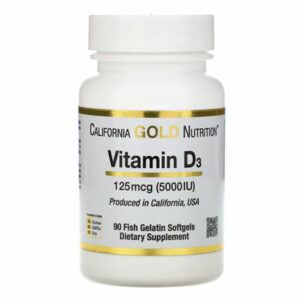Basic concepts of Vitamin D
Vitamin D is a trace vitamin found in certain foods, including herring, mackerel, sardine, and tuna fat.
Vitamin D is sometimes added to dairy products, juices, and cereals for easier access to Vitamin D. Among them, such products are called “Vitamin D enhanced” product.
However, most Vitamin D is obtained by exposure to sunlight, which accounts for 80% to 90% of the body. Vitamin D can also be synthesized by the experiment.
What are the benefits of taking Vitamin d?
Vitamin D can be used to treat and prevent Rickets, Osteoporosis, Osteomalacia, Hyperparathyroidism, Osteogenesis Imperfecta, and can also be used to prevent falls and fractures in people at risk of osteoporosis, and to avoid low calcium and bone loss in Kidney Failure patients (Renal Osteodystrophy, Also known as a renal bone disease).
It can also be used to treat cardiovascular conditions, including hypertension and high cholesterol, diabetes, obesity, muscle weakness, multiple sclerosis, rheumatoid arthritis, Chronic Obstructive Pulmonary Disease, Asthma, bronchitis, PMS, teeth, and gums Skin symptoms such as diseases, Vitiligo, Scleroderma, Psoriasis. Actinic keratosis and Lupus vulgaris.
Vitamin D can also be used to activate the immune system, avoid autoimmune disease and prevent cancer.
Vitamin D is related to maintaining certain minerals constant, such as phosphorus and calcium, so when there is a low phosphorus content, such as Family Hypophosphatemia and Fanconi Syndrome and low calcium content, such as hypoparathyroidism and false Vitamin D is used for parathyroid.
When Vitamin D exists in the form of Calcitriol or Calcipotriene, it is generally used directly on the skin to treat a specific type of psoriasis.
The principle of Vitamin D
At present, there is not enough research on the efficacy principle of Vitamin D. Please discuss further information with the doctor.
However, it is known that the minerals calcium and phosphorus in the body need Vitamin D to maintain constant. In addition, Vitamin D also plays an important role in maintaining bone structure.
Precautions
If you have the following situations, please consult your doctor or pharmacist before use:
- You are pregnant or breastfeeding: because when you are pregnant or breastfeeding, you should only take medicines as directed by your doctor.
- You are taking other medicines.
- You are allergic to Vitamin D, other medicines, or any other herbs.
- You currently have other diseases or conditions.
- You have any type of allergy, such as food, dyes, preservatives, or animals…allergy.
Compared with the regulation of medicines, the regulation of herbal medicines is less strict, and more research is needed to prove its safety.
Before use, please ensure that the benefits outweigh the risks. It is recommended to consult an herbalist or physician for more information.
Is it safe to use Vitamin D?
For most people, taking Vitamin D orally or intravenously is safe unless it is an overdose.
Long-term use of more than 4000 units of Vitamin D per day may be unsafe and may lead to hypercalcemia. However, short-term treatment of Vitamin D deficiency may require a higher intake.
Therefore, this type of treatment should be carried out under the supervision of medical personnel.
Special considerations
Pregnancy or breastfeeding
Vitamin D is generally safe for women who are pregnant and breastfeeding when the daily dosage is less than 4000 units, but exceeding this amount may cause serious fetal harm.
Kidney disease
Vitamin D may increase blood calcium levels and increase the risk of Harding of the Arteries with severe kidney disease.
Renal bone lesions can occur when the kidneys are unable to maintain calcium and phosphorus levels in the blood, so close monitoring of kidney disease patients is necessary. Blood calcium content.
High blood calcium content
Vitamin D will worsen this symptom.
Atherosclerosis
Vitamin D may worsen the condition, especially in patients with kidney disease.
Sarcoidosis
Vitamin D will increase blood calcium content in patients with sarcoidosis, which may cause kidney stones and other problems.
Histoplasmosis
Vitamin D will increase the blood calcium content of patients with histoplasmosis, which may cause kidney stones and other problems.
Over-active parathyroid gland/ Hyperparathyroidism
Vitamin D will increase blood calcium content in patients with hyperparathyroidism.
Lymphoma
Vitamin D will increase the blood calcium content of patients with lymphoma, which may cause kidney stones and other problems.
Tuberculosis
Vitamin D will increase the blood calcium content of patients with pulmonary tuberculosis, which may cause complications such as kidney stones.
Potential side effects of using Vitamin D
Using too much Vitamin D will cause side effects such as weakness, fatigue, sleepiness, headache, loss of appetite, dry mouth, metallic taste in the mouth, nausea, vomiting, and other side effects.
Not everyone will experience these side effects. Some side effects may not be listed. If you have any concerns about side effects, please consult your doctor.
Potential interactions with Vitamin D
Vitamin D may interact with the medicine or physical condition you are taking. Please discuss it with your doctor or herbalist before use. Products that interact with Vitamin D include:
Aluminum
Many Antacids contain aluminum, and Vitamin D will increase the amount of aluminum absorbed by the body; patients with kidney disease should use Vitamin D 2 hours before or 4 hours after using antacids.
Calcipotriene
Simultaneous use of Vitamin D and calcipotriol may increase the effects and side effects of calcipotriol. If you take calcipotriol, you should avoid using Vitamin D.
Digoxin
It can be used to help make the heartbeat stronger. Using Vitamin D and Digoxin at the same time may increase the effect of digoxin and cause arrhythmia.
If you are using digoxin, use Vitamin D nutritional supplements Discuss with the physician before taking the product.
Diltiazem
Using a large amount of Vitamin D and Ditaizan at the same time may reduce the effect of Ditaizan.
Verapamil
Vitamin D can help the body absorb calcium, if you are using Verning, please do not use a lot of Vitamin D, because both calcium and Verning will affect the heart.
Water pills
Simultaneous use of large amounts of Vitamin D and certain diuretics may cause excessive calcium in the body and may cause serious side effects, including kidney problems; diuretics that can cause the above problems include Chlorothiazide, Hydrochlorothiazide, Indapamide, Metolazone, Chlorthalidone.
Cimetidine
It will reduce the body’s ability to convert Vitamin D, and may also reduce the efficacy of Vitamin D.
Heparin
Heparin can slow down thrombosis, and long-term use will increase the risk of fractures. People who use these drugs should be rich in calcium and Vitamin D in their diet.
Low molecular weight heparins
Long-term use of low-molecular-weight heparin will increase the risk of fracture. People who use these drugs should be rich in calcium and Vitamin D in their diet.
Low-molecular-weight heparins include Enoxaparin, Dalteparin, and Tinzaparin.
The recommended dosage of Vitamin D
The following information is not a medical diagnosis, please consult a physician or herbalist before using.
What is the general usage of Vitamin D
Oral:
- Prevention of osteoporosis and fractures: The elderly should use 400-1000 international units (IU) per day; some experts recommend higher doses, which can reach 1000-2000 international units per day.
- Prevention of falls: 800 to 1000 international units (IU) per day, with 1000 to 1200 mg of calcium per day.
- Prevention of Multiple Sclerosis: Long-term use of at least 400 International Units (IU) per day, mainly given as a multivitamin supplement.
- Prevent all cancers: 1400 to 1500 mg of calcium per day for menopausal women plus 1100 International Units (IU) Vitamin D3.
- Muscle pain caused by statins: 50,000 units of Vitamin D2 or Vitamin D3 a week, or 400 international units (IU) a day.
- Influenza prevention: 1200 International Units (IU) Vitamin D per day.
- Most vitamin nutrition products contain only 400 international units (10 micrograms) of Vitamin D.
The recommended daily intake published by The Institute of Medicine is estimated according to Vitamin D required by most people, and varies according to age:
- The recommended daily dosage for adults aged 1 to 70 years is 600 international units.
- The recommended daily dosage for elderly people over 71 years old is 800 international units.
- The recommended daily dosage for pregnant and nursing women is 600 IU.
- Infants from 0-12 months have enough daily intake of 400 IU.
American Academy of Pediatrics recommends:
- Vitamin D for all infants and children, including teenagers, is recommended to be increased to 400 IU per day.
The National Osteoporosis Foundation recommends:
- Adults under 50 years of age use 400 to 800 international units of Vitamin D daily.
- Older people use 800 to 1,000 international units of Vitamin D daily.
The North American Menopause Society recommends:
- Women who are at risk of lack of Vitamin D due to too little exposure to sunlight should use 700 to 800 International Units of Vitamin D daily.
Osteoporosis Canada recommends:
- Adults under the age of 50 use Vitamin D from 400 to 1,000 international units per day.
- People over 50 years old use Vitamin D 800-2000 international units every day.
The Canadian Cancer Society recommends:
- Adults living in Canada should use Vitamin D in 1,000 international units per day in autumn and winter.
Many experts now recommend using Vitamin D supplements containing cholecalciferol to achieve basic intake, because cholecalciferol seems to be more effective than another Vitamin D form called ergocalciferol.
The dosage of Vitamin D varies from person to person and is mainly affected by age, health, and other diseases; and this type of herbal supplement is not necessarily safe, so please consult your physician or herbalist to understand the suitability before taking Your usage.
Types of finished products of Vitamin D
- Naturally exists in sunlight, certain foods, and dairy products
- capsule
- Soft capsule
- liquid
Where can I buy the best Vitamin D supplements?
In recent years, food safety problems in various countries have exploded, and it is not healthy but black-hearted products that everyone spends on. Therefore, European and American products with relatively strict quality control have become popular products.
And iHerb.com is a large-scale medical cosmetics e-commerce company in the United States. It has a high satisfaction rate of 97% in the evaluation of Google customers. It provides global home delivery so that you can buy it without risking buying fakes through purchasing high-quality health products.

